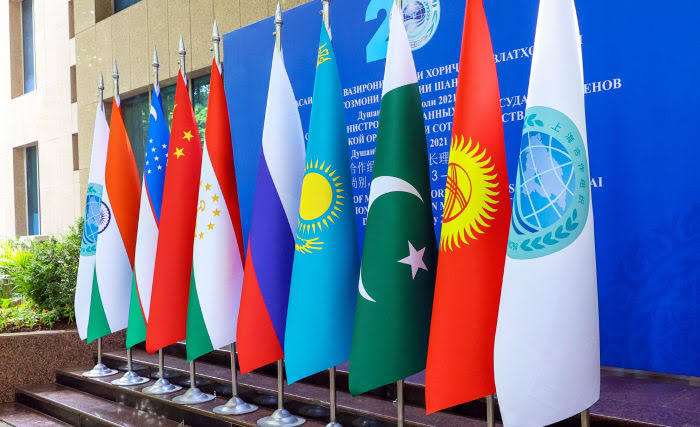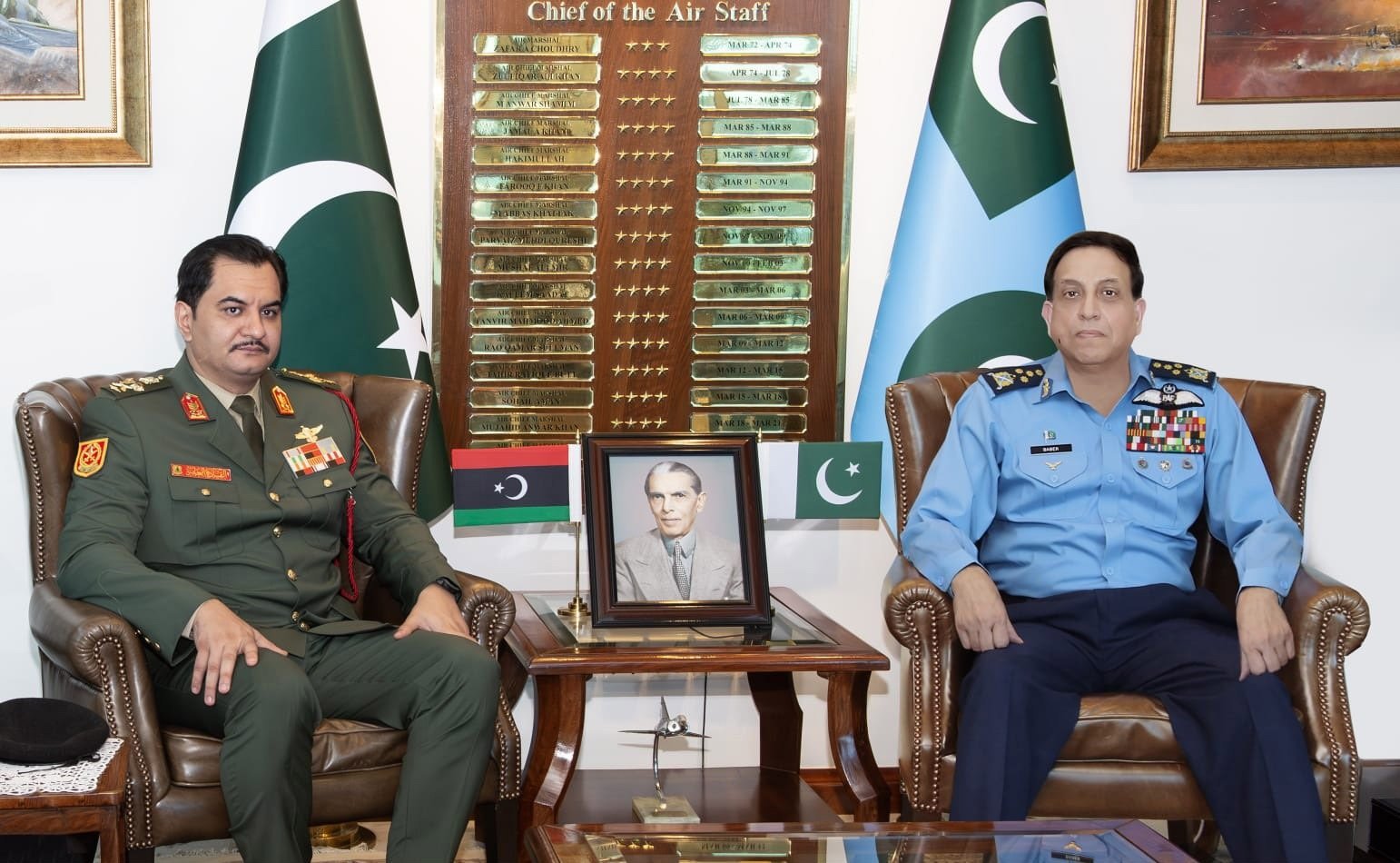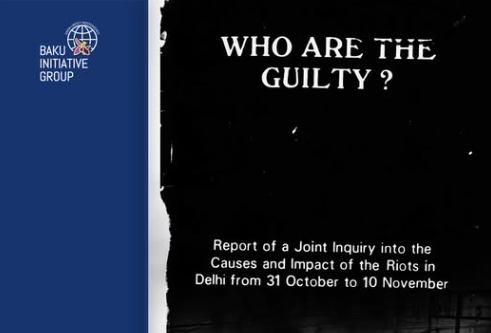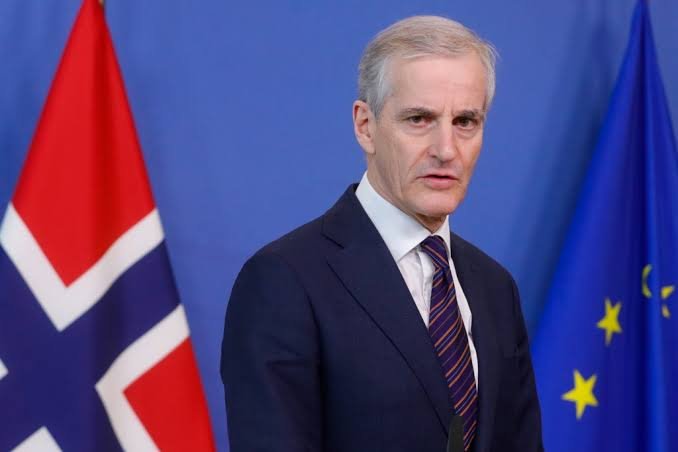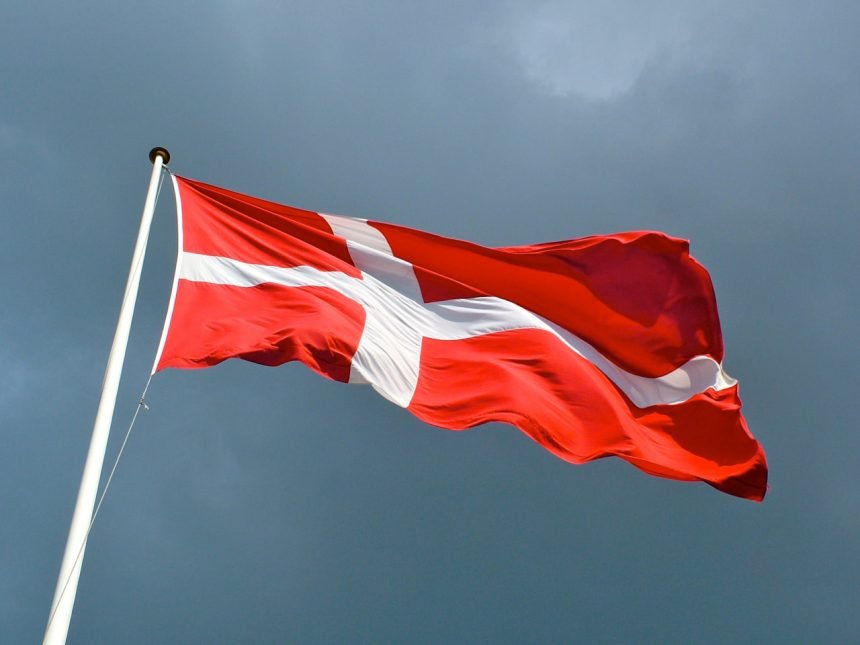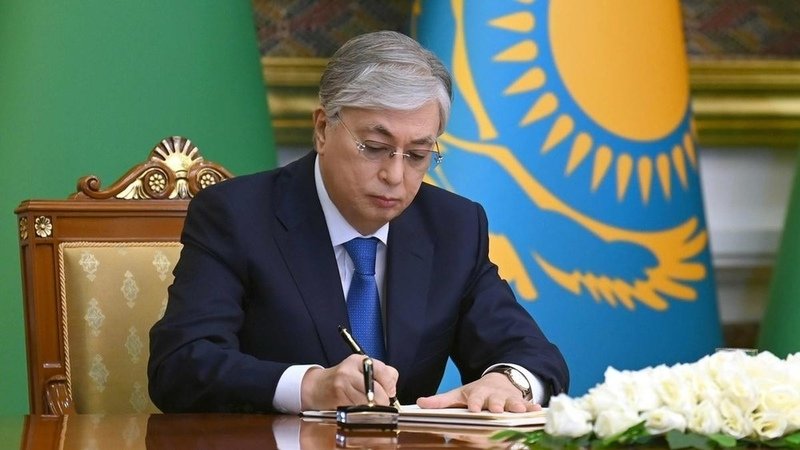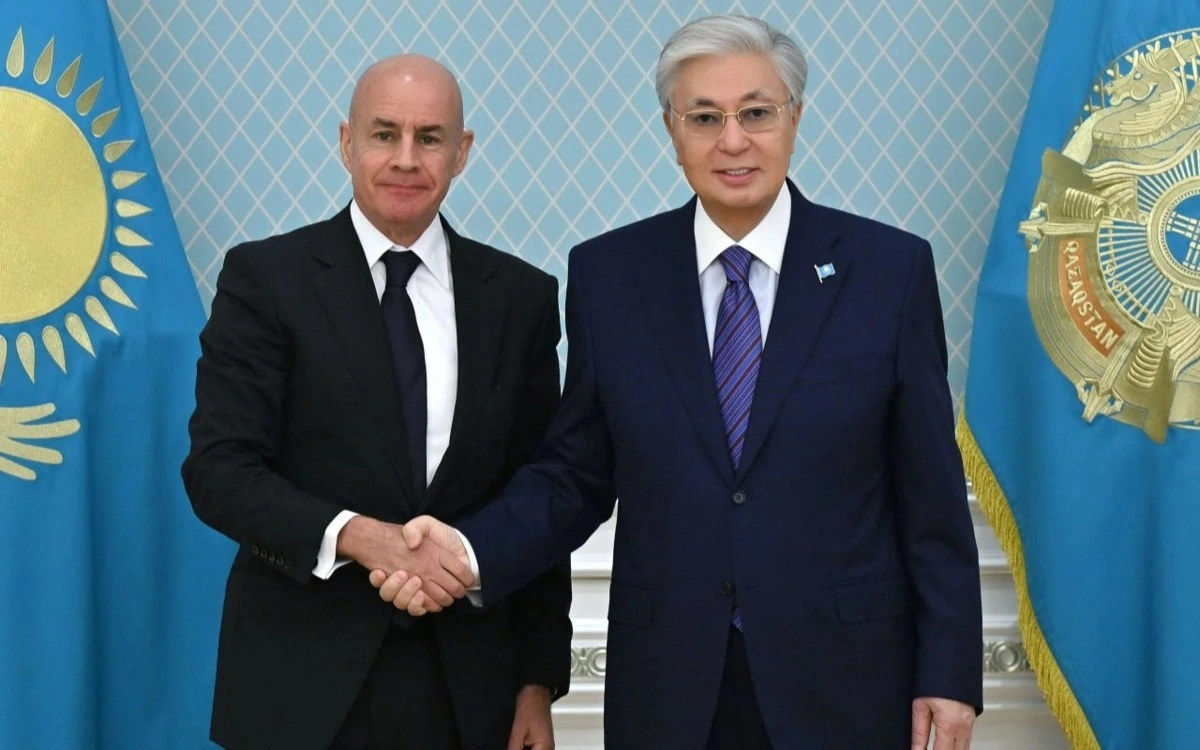Overview
The 24th summit of the Council of Heads of State of the Shanghai Cooperation Organization (SCO), chaired by Kazakhstan, took place in the capital, Astana, on July 4, 2024. Titled “Strengthening Multilateral Dialogue – Striving Towards a Sustainable Peace and Prosperity,” the summit adopted the Astana Declaration and approved 25 strategic documents covering energy, security, trade, finance, and information security.
Belarus was officially admitted as a full member state of the SCO, making it a 10-member organization.
Following the summit, China assumed the rotating presidency of the SCO for 2024-2025.
This factsheet outlined the key points from the summit.
Key Points from President Tokayev’s Statement at the SCO Meeting
- Outcomes of Kazakhstan’s SCO chairmanship President Tokayev summed up the results of Kazakhstan’s chairmanship in the SCO:
- Events Held:
- 150 events including digital, tourism, energy, and business forums.
- SCO Youth Council meeting.
- Sixty New Documents Developed Including:
- Anti-drug strategy.
- Plan for implementing the economic cooperation strategy.
- Environmental protection agreement.
- Energy cooperation development strategy.
- International Partnerships:
- Expansion of the Organization’s international partners.
- Revival of the Special Working Group on
- Promoting Investment.
- Positive dynamics in transitioning to payments in national currencies.
- Economic Impact:
- Dynamic development of trade and economic cooperation in the SCO space.
- Cultural and Humanitarian Initiatives:
- Launch of anchor projects such as “Spiritual Relics of the SCO States.”
- First international music festival “SCO Silk Way.”
- Identification of 10 tourist destinations for joint projects.
- Almaty designated as the cultural and tourist capital of the SCO for the duration of the SCO membership.
- Overall Achievement:
- Full implementation of goals and tasks set from the previous summit.
- Events Held:
- SCO Priorities Outlined by President Tokayev President Tokayev outlined the key areas of strategic significance for the member states of the ‘Shanghai 10’:
- Strengthening Mutual Trust and Security Cooperation:
- Addressing the global crisis in international affairs.
- Enhancing the SCO’s stabilizing and creative role to uphold international law and prevent geopolitical splits.
- Developing and adopting an agreement on confidence-building measures in the military sphere with a focus on combating the “forces of three evils” – terrorism, separatism, and extremism.
- Promoting the SCO initiative on World Unity for Just Peace, Harmony, and Development, initially proposed by Kazakhstan and supported by members of the SCO.
- Enhancing Cybersecurity:
- Developing a mechanism for constant information exchange and adoption of best practices.
- Ensuring the steady functioning of the SCO information infrastructure through the adopted action plan on international information security.
- Expanding Trade and Economic Ties:
- Addressing the need for new economic growth points and a new development paradigm.
- Expanding trade and economic cooperation, facilitating free movement of capital and technologies, and combating climate challenges. Trade between Kazakhstan and SCO member states grew by 6.5% in 2023.
- Proposal to create an integrated platform for discussing and approving investment projects.
- Suggestion to establish a mechanism for financial support of project activities based on the Astana International Financial Centre (AIFC).
- Strengthening Transport Connectivity:
- Building efficient corridors and reliable supply chains.
- Synergizing China’s One Belt, One Road initiative with other regional transport routes like the Trans-Caspian International Transport Route (Middle Corridor) and North-South Trans-Eurasian Corridors.
- Establishing a partner network of strategic ports and logistics centers within the SCO.
- Strengthening Mutual Trust and Security Cooperation:
Statements From Other SCO Summit Participants
- President Xi Jinping (China):
- Praised Kazakhstan’s positive role in leading the SCO.
o Echoed the significance of the Shanghai Spirit.
o Urged member countries to consolidate unity against foreign interference in internal affairs.
- Praised Kazakhstan’s positive role in leading the SCO.
- President Vladimir Putin (Russia):
- Praised the solid package of documents and resolutions prepared with Kazakhstan’s active participation.
o Supported resuming the SCO-Afghanistan contact group to normalize Afghanistan’s situation.
o Highlighted resolutions to transform the SCO Regional Anti-Terrorist Structure and establish an anti-drug center in Dushanbe to enhance security.
- Praised the solid package of documents and resolutions prepared with Kazakhstan’s active participation.
- Prime Minister Shehbaz Sharif (Pakistan):
- Remarked that Kazakhstan reaffirmed its commitment to promoting the SCO’s collective goals.
- Acting President Mohammad Mokhber (Iran):
- Highlighted the significant contribution of the Kazakh presidency in promoting cooperation and advancing the activities of the SCO.
- President Sadyr Japarov (Kyrgyz Republic):
- Emphasized unity and joint efforts in overcoming global challenges like the pandemic, climate change, and economic instability.
- Stressed the SCO’s commitment to resolving conflicts based on international norms and principles.
- Called for reducing trade barriers within the SCO and recalled initiatives to create the SCO Development Bank and Development Fund.
- Secretary-General António Guterres (United Nations):
- Highlighted Kazakhstan’s important voice in the UN, noting the country’s efforts towards peace, bringing together parties in conflict to solve disagreements, and mediating in international affairs.
- Noted that the SCO has the power and the responsibility to push for peace.
- SCO Secretary-General Zhang Ming (China):
- Thanked Kazakhstan for the productive work as the Chair of the SCO.
- Highlighted the Shanghai Spirit as a driving force behind the SCO’s progress.
- Identified Central Asia as the core of the SCO, linking regional peace and prosperity to the SCO’s stability and development.
- Thanked Kazakhstan for its work as the SCO chair and congratulated China on assuming the position.
Outcomes of the SCO Summit
Signed Documents and Resolutions
- The 24th summit of the Council of Heads of State of the Shanghai Cooperation Organization adopted the Astana Declaration and approved 25 strategic documents covering energy, security, trade, finance, and information security.
- Key resolutions included the cooperation programs to combat terrorism, separatism, and extremism for 2025-2027, the Anti-Drug Strategy for the next five years, and its corresponding Action Program.
- Strategies for energy cooperation until 2030 and the Economic Development Strategy’s Action Plan until 2030 were also approved.
- Resolutions encompassed the Association of Investors, programs for developing cooperation in protected areas and eco-tourism, and mechanisms for financing SCO project activities.
- The member states additionally signed statements affirming principles of good neighborliness, trust, and partnership, ensuring the safety of drinking water and sanitation, and promoting effective waste management.
- They also formalized an agreement on environmental protection cooperation among SCO governments.
The list of documents includes:
- Astana Declaration – Member States underscored the SCO’s role in bolstering global peace, security, and stability and shaping a new democratic, equitable international political and economic order, inviting the global community to join the initiative.
- Initiative on World Unity for Just Peace, Harmony, and Development
- Strategy for SCO Development until 2035
- Proposals for Improving SCO Activities
- Admission of Belarus as a Member State
- Member States’ Contributions for Belarus’ Membership
- Cooperation Program in Countering Terrorism, Separatism, and Extremism (2025-2027)
- Anti-Drug Strategy (2024-2029) and Action Plan
- Energy Cooperation Strategy until 2030
- Economic Development Strategy Action Plan until 2030
- Association of Investors of SCO Member States
- Program for Cooperation in Protected Areas and Ecotourism
- Qingdao as the Tourist and Cultural Capital (2024-2025)
- Roadmap for Strengthening Interaction with Dialogue Partners
- Financial Support Mechanisms for SCO Project Activities
- MOU with Central Asian Regional Information Coordination Center on Narcotics
- Plan for Ensuring International Information Security
- Appointment of the SCO Secretary-General
- Appointment of the Director of the Executive Committee of the SCO Regional Anti-Terrorist Structure
- Secretary-General’s Report on SCO Activities
- Report on Regional Anti-Terrorist Structure Activities (2023)
- Statement on Principles of Good-Neighborliness, Trust, and Partnership
- Statement on Drinking Water and Sanitation Safety
- Statement on Effective Waste Management
- Agreement on Cooperation in Environmental Protection
SCO+ Format
Proposals by President Tokayev
President Kassym-Jomart Tokayev proposed several key strategies to foster multilateral cooperation among the SCO member states at the inaugural SCO+ format during the organization’s 24th summit. Tokayev’s proposals include the following:
- Collective Facilitation for Peace and Development:
- Enhance the UN’s role as a major international institution.
- Address global security and 21st-century challenges.
- Propose a resolution supporting Kazakhstan’s Initiative On World Unity for Just Peace and Harmony for the 80th anniversary of the UN and the 20th anniversary of SCO-UN cooperation.
- Enhancing Trade and Economic Ties:
- Support for China’s plan to expand market access and increase SCO trade turnover to $3 trillion.
- Utilize over 350,000 kilometers of railroads to develop a large Eurasian belt for global trade.
- Ensure connectivity through the Belt and Road Initiative, the Trans-Caspian International Transport Route, and the North-South corridor.
- Environmental Concerns:
- Address the critical impact of climate change, referencing recent floods in Kazakhstan.
- Develop measures to address internal water bodies’ degradation.
- Introduce new water-saving technologies.
- Achieve UN General Assembly goals related to environmental protection as a contribution of the SCO.
- Cultural, Humanitarian, and Educational Cooperation:
- Establish cultural centers to enhance cultural and humanitarian cooperation among SCO countries.
- Engage youth by creating development opportunities and fostering more intense contacts.
- Expand the network of SCO universities.
- Increase the number of grants for students, particularly in technical fields.
World Leaders Participating in the SCO Summit
- Azerbaijani President: Ilham Aliyev
- Belarusian President: Alexander Lukashenko
- Chinese President: Xi Jinping
- Indian Representation: External Affairs Minister Subrahmanyam Jaishankar
- Kazakh President: Kassym-Jomart Tokayev
- Kyrgyz President: Sadyr Zhaparov
- Mongolian President: Ukhnaagiin Khürelsükh
- Pakistani Prime Minister: Shehbaz Sharif
- Qatari Leader: Emir Sheikh Tamim bin Hamad Al Thani
- Russian President: Vladimir Putin
- Tajik President: Emomali Rahmon
- Turkish President: Recep Tayyip Erdogan
- Uzbek President: Shavkat Mirziyoyev
- United Nations Secretary-General: António Guterres
Background to the SCO
- The Shanghai Cooperation Organization was established in Shanghai on June 15, 2001, by six founding nations: Kazakhstan, China, the Kyrgyz Republic, Russia, Tajikistan, and Uzbekistan.
- This intergovernmental organization evolved from the earlier Shanghai Five mechanism, reflecting a growing need for regional cooperation and security.
- The SCO now has 10 members, including India, Iran, and Pakistan, Belarus, in addition to the founding members. There are two observer states – Afghanistan, and Mongolia, and 14 dialogue partners, including Azerbaijan, Armenia, Qatar, the United Arab Emirates, Saudi Arabia, and Türkiye.
- The SCO represents 40% of the world’s population, and member countries contribute approximately over $23 trillion to global GDP.
